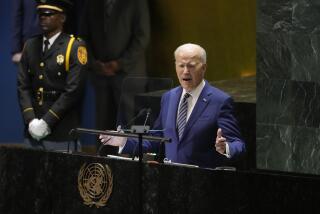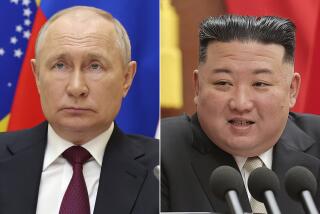Russian proposal on Syria brings relief to many world leaders
WASHINGTON — By providing a way to avert a U.S. military strike, Russia’s proposal that Syria surrender its chemical weapons has offered a host of world leaders an exit from an increasingly damaging political crisis.
The plan, which is expected to be hashed out in the United Nations over the next week or longer, has quickly gained supporters in Europe, the Middle East and the U.S. Congress. Despite numerous complications and likely setbacks ahead, the idea has gained momentum because it offers major advantages for each of those parties. It also creates clear winners and losers.
Even if the Russian proposal bogs down at the U.N., as many observers expect, it offers a way to put the issue back in meeting rooms rather than on the battlefield, resolving anxieties in many world capitals.
The White House has promised that U.S. airstrikes against Syria, which President Obama proposed as a way to punish the government of President Bashar Assad for what U.S. officials say was a chemical weapons attack last month that killed more than 1,400 people, would be “narrow and limited.”
But the planned bombardment by cruise missiles would certainly have inflicted real damage, most likely including civilian casualties, and would have raised the risks of escalation and retaliation that few world leaders wanted to deal with.
“This was going to be a pretty serious attack, so the Russian proposal has come as a face-saver for a whole lot of people,” said Geoffrey Kemp, a top national security aide in the Reagan White House. “That’s why we’ve seen this extraordinary circus as everybody’s rushed over to this idea.”
The Syrians demonstrated their worries about the Pentagon’s ability to inflict damage as they scrambled in recent weeks to hide troops and equipment. The Russians, with ships in the neighborhood and probably technical advisors in Syria, didn’t want the risk of an unintended conflict with the U.S.
America’s European allies, concerned about chemical attacks but facing open rebellion from antiwar constituents, were desperate for a diplomatic out.
And the Obama administration was facing the prospect of a defeat in Congress on a question of war and peace, a setback that no American president of the modern era has suffered.
Compared with that, the Russian plan holds several attractions. It almost certainly would not lead to complete elimination of Syria’s chemical weapons – few expect that Russia would support stripping its longtime ally of a stockpile that has been assiduously built up for decades. But a U.S. military bombardment would not have eliminated the weapons, either. The Obama administration was been planning to avoid targeting chemical stockpiles, for fear of dispersing deadly gases over civilian populations.
The plan could, however, provide a potential means for deterring Assad from using chemical weapons in the future. Deterrence was a major goal of Obama’s plan to hit Syria with cruise missiles.
Even if the Syrians don’t turn over much of their chemical arsenal, a U.N. blessing of a program to remove the weapons would focus attention on the Syrian stockpile and probably make Assad more careful about provocative new attacks. With Russia’s prestige now attached to the plan, Moscow might push Assad hard not to act in ways that could invite Western retaliation, analysts said.
Russian President Vladimir Putin appears especially delighted at the tentative acceptance of the plan. It enables him to show that Moscow remains a major player in the Middle East and the world.
“He’s been eager to show that he can fill the partial diplomatic vacuum the U.S. has left in the Middle East, and this lets him make that point,” said Andrew Weiss, a White House advisor on Russia during the Clinton administration and now research director at the Carnegie Endowment for International Peace.
Perhaps the clearest loser in the latest developments are the pro-Western factions of the Syrian rebels, who have worked hard to bring the United States into a direct military role in the war. They’ve now received clear evidence of how resistant the American public is to involvement in their conflict, even if the White House appears to be promising to provide some rebel groups with more powerful weaponry and training.
Also likely to be disappointed are the Saudis, their Persian Gulf allies and the Turks, all of whom oppose Assad and have sought to draw the U.S. and its allies into a larger military role in Syria.
These most vocal supporters of the rebels “are likely to be skeptical about the Russian proposal, and discontent at the direction this has taken,” said Brian Katulis, a Middle East and South Asia specialist at the Center for American Progress.
Israel also may worry, particularly about what the Syrian saga says about potential U.S. military pressure on Iran, a key ally of Assad. The Israeli government is depending on the United States to prevent Iran from developing nuclear weapons. It has been lobbying members of Congress to back Obama’s plan to bombard Syria, in the belief that military action would send a strong message to Tehran about U.S. resolve.
Still, Israel and its U.S. supporters may have dodged a public relations setback by avoiding an outright defeat in Congress. That would have made them look like isolated advocates for American war-making and would have called into question the extent of their influence in Washington.
“They were in a difficult position, and now they’re sort of off the hook,” said Kemp, who is with the Center for the National Interest think tank in Washington.
For the Obama administration, a climb-down from strikes will strengthen the belief in many countries that Obama is deeply leery of military action and wants America’s focus turned inward.
Yet while that may make America look weaker, the judgment would have been far harsher if Congress had bludgeoned the White House by turning down a request for military authorization.
The Russians “were pretty shrewd to make this offer,” Rep. Adam B. Schiff (D-Burbank) said in an interview. If the offer proves to have substance, “it may be shrewd for us to accept it.”
ALSO:
Four face death penalty after conviction in Indian gang rape
Egypt bans thousands of unlicensed preachers from giving sermons
Voice of Iran hostage crisis tapped as VP, environmental advocate
Twitter: @richtpau
More to Read
Start your day right
Sign up for Essential California for news, features and recommendations from the L.A. Times and beyond in your inbox six days a week.
You may occasionally receive promotional content from the Los Angeles Times.







